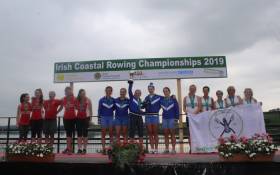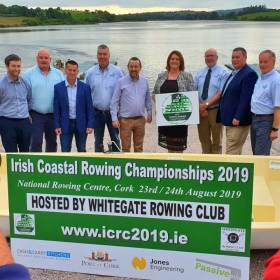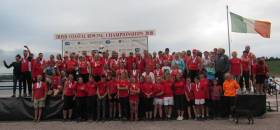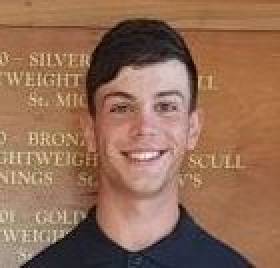Displaying items by tag: NRC
#Coastal Rowing: Myross won the senior men’s title for the second weekend in-a-row at the Irish Coastal Rowing Championships at the National Rowing Centre. The had also won at the ICRF All-Ireland. Killorglin won the senior women’s crown.
In excellent conditions, the contest for the Club of the Championships was close. The prize goes to the club with the most wins. Holders Kilmacsimon could have taken it with wins in the final two races but were denied and Whitegate, the hosts, were crowned champions.
Coastal Rowing Championships Launched
#Rowing: The 2019 Irish Coastal Rowing Championships have been officially launched. The event, on August 23rd and 24th, will be hosted by Whitegate Rowing Club from east Cork. The launch was at the regatta venue, the National Rowing Centre at Farran Wood, on Tuesday. The special guest was Ireland rower Monika Dukarska. The Killorglin woman has been a world coastal rowing champion.
The regatta director, Shane Russell, said the NRC was a superb facility. “I would like to thank Rowing Ireland, Whitegate Rowing Club and everyone who is assisting us in this event.”
The Jones Engineering Group, Port of Cork, Cash and Carry Kitchens and Passive Sills were all announced as main sponsors with a further announcement due in the coming weeks.
#Rowing: The agm of Rowing Ireland was businesslike and brief – coming in under an hour.
Neville Maxwell, the chair of the high performance committee, praised the “energy and enthusiasm” of high performance director Antonio Maurogiovanni. “He wants a system which is open and transparent,” he said.
Maxwell said that there was a move away from lightweight rowing and it was essential to build a programme which would last. Finding new sources of income was very important.
Leo Gibson replaced outgoing treasurer Dan Buckley, who has stepped down. The Old Collegians man spoke of the hope of drawing down Large Scale Sports Infrastructure grants.
Rowing Ireland president Eamonn Colclough said the priority was to finance work on the National Rowing Centre, with the hope of replacing the slips and, perhaps, the buoyed course. Next in priority would be Lough Rinn and then the proposed new Blessington course.
Colclough said that he hoped there was a big uptake on the package deal which will give Irish spectators a good way to travel to the World Rowing Championships in Linz in Austria in August/September. “I would love to hear The Fields of Athenry ring out over the waters in Linz,” he said.
Rowing Ireland is preparing to facilitate clubs using Lough Rinn by taking over the insurance requirements asked for by Leitrim County Council. The Council will “spend hundreds of thousands of euro” on developing the course and surrounds, Colclough told the agm.
The fixtures calendar for 2020 emerged in a very similar form to the one proposed. Erne Head moved to a week earlier than scheduled and will now take place on March 7th and the Castleconnell Sprint Regatta takes a similar step to May 9th. Carlow’s Dambuster Head is set to take place on February 1st.
Galway Regatta (June 6th) and Shandon Masters Regatta (August 15th) were late additions to the draft calendar put before delegates.
Awards
President’s: Seamus Scully, Carlow
Connacht: Paul Gallen
Leinster: Gerry Conway, Frank Moore, Willie Ryan, Mick Carney, Andrew Coleman
Munster: Brian Sheppard
Ulster: Jeremy Johnston
Skibbereen Head Cancelled
#Rowing: Skibbereen Head of the River, set for Saturday, November 17th, at the National Rowing Centre, has been cancelled. A forecast of high winds led the organisers to make the decision on safety grounds.
Wonderful Day for Kilmacsimon at Irish Coastal Rowing Championships
#CoastalRowing: Kilmacsimon emerged with an outstanding seven wins at the inaugural Irish Coastal Rowing Championships at the National Rowing Centre. Cork clubs were dominant at the event. Ring, with three wins, were the closest challengers to Kilmacsimon, which became the Club of the Championships. Kilmacsimon is based on the River Bandon in west Cork.
Irish Coastal Rowing Championships, National Rowing Centre, Cork (Selected Results; winners of finals)
Saturday
Men
Open Sprint: Myross
Timber Yawl: Kilmacsimon
Open Classic: Myross
Women
Open Sprint: Castletownbere
Timber Yawl: Galley Flash
Open Classic: Castletownbere
Mixed
Masters: Passage West
Sunday
Men
Coastal Four – Senior: Galley Flash. Inter: Blackrock. Under-21; Kilmacsimon. Junior: Myross. Jun 18: Ring. Jun 16: Courtmacsherry A. Pre-Veteran: Blackrock A. Veteran: Whitegate. Masters: Kilmacsimon.
Women
Coastal Four – Senior: Galley Flash. Inter: Killurin. Under-21: Kilmacsimon and Killorglin (tie). Jun: Rushbrooke. Jun 18: Kilmacsimon A. Under-16: Portmagee A. Pre-Veteran: Ring. Veteran: Kilmacabea. Masters: Rushbrooke.
Mixed
Coastal Four – Senior: Kilmacsimon. Pre-Veteran: Ring. Veteran: Castletownbere A.
#CoastalRowing: Castletownbere and Myross both won on the double at the Irish Coastal Rowing Championships at the National Rowing Centre in Cork today. There was a big entry, especially at underage level, and multiple heats. There is an extensive set of finals scheduled for tomorrow, Sunday.
Irish Coastal Rowing Championships, National Rowing Centre, Cork (Selected Results; winners of finals)
Men
Open Sprint: Myross
Timber Yawl: Kilmacsimon
Open Classic: Myross
Women
Open Sprint: Castletownbere
Timber Yawl: Galley Flash
Open Classic: Castletownbere
Mixed
Masters: Passage West
Rowers Set for Coastal Rowing Championships
#Coastal Rowing: The inaugural Irish Coastal Rowing Championships will take place this Saturday and Sunday, August 18th and 19th at the National Rowing Centre in Farran Wood, Cork. Clubs from all four provinces are set to compete.
Eddie Farr, chair of the Coastal Championships Committee, said: “This is an incredibly proud moment in all our rowing lives, to at last get to row at our national and international rowing venue.”
The Championships, hosted by Rushbrooke Rowing Club, will see clubs race in over 30 different race categories, ranging from Under 12 to Masters, with race lengths ranging from 800 to 2,300 metres. Several thousand rowers and spectators are expected to attend the two day Championships.
The long-standing All Ireland Coastal Rowing Championships will also be held this weekend, from Friday to Sunday (August 17th to 19th) in Wexford. There will be an array of races in one-design Celtic boats, Currachs, East coast Skiffs, Wexford cots, Kerry four-oars, Donegal skiffs and Seine boats.
#Rowing: Britain won the first race of the Coupe de la Jeunesse 2018 at the National Rowing Centre in Cork. The junior women’s eight, the traditional starting event for the event, featured five boats. Spain and France took the minor medals, while Ireland took fourth. The Coupe continues until Sunday.
Coupe de la Jeunesse, National Rowing Centre, Day One
Junior Women’s Eight – Final: 1 Britain 7:04.9, 2 Spain 7:07.1, 3 France 7:07.7; 4 Ireland (A Tyther, R O’Donoghue, C O’Sullivan, J Duggan, J Harrington, E Murphy, E Carney, C Nic Dhonncha; cox: V Hanlon) 7:15.5.
#Rowing: Skibbereen won three of the four Division One titles on offer in the first session of finals at Cork Regattat at the National Rowing Centre. However, the final of the men’s pair belonged to David O’Malley and Shane Mulvaney of UCD. They raced well in the hot weather and finished well clear of Skibbereen’s Shane O’Driscoll and Mark O’Donovan.
Gary O’Donovan followed his brother Paul O’Donovan over the line in the men’s single sculls, while Denise Walsh got the better of Cork’s Lisa Dilleen in the women’s single.
The women’s pair was won by Aine McCarthy and Niamh Casey of Skibbereen.
Cork Regatta, National Rowing Centre (Selected Results)
Men
Eight – Div Two: Neptune (club two) 6:22.95; 4 Trinity (nov) 6:34.32; 5 Col Iognaid (jun 16) 6:35.63; 6 Shandon (jun 18B) 6:43.79.
Pair – Div One: 1 UCD (S Mulvaney, D O’Malley; sen) 6:53.31, 2 Skibbereen (M O’Donovan, S O’Driscoll; sen) 6:59.98, 3 Enniskillen (jun 18A) 7:06.75; 6 Cork A (inter) 7:23.68. B Final: 6 Neptune A (club one) 7:24.50.
Single Sculls: 1 Skibbereen (P O’Donovan; sen) 6:59.73. B Final: UCC (H Sutton; lwt) 7:20.63. C Final: 1 Shandon (E Gaffney; jun 18A) 7:28.92; 2 Queen’s (N Hull; inter) 7:29.86
Women
Pair – Div One: 1 Skibbereen (A McCarthy, N Casey; sen) 7:49.73; 4 Col Iognaid (Jun 18A) 8:07.86; Shandon (club one) 8:08.78. C Final: 4 Shandon (inter) 8:36.00.
Sculling, Quadruple – Div Two: 1 Cork A (club two) 7:50.05; 3 Carlow (jun 16) 8:03.97. B Final: Carlow (jun 18B) 8:13.43; 4 Queen’s (nov) 8:25.47.
Curry and Keating Top Double at Trial [UPDATE]
#Rowing: Molly Curry and Aobhinn Keating had the fastest time in a women’s double at the Ireland junior trial at the National Rowing Centre in Cork. The Coleraine Grammar School and Skibbereen combination covered the 2,000 metres in seven minutes and 45.13 seconds. We apologise for having got this wrong in the original report.


































































